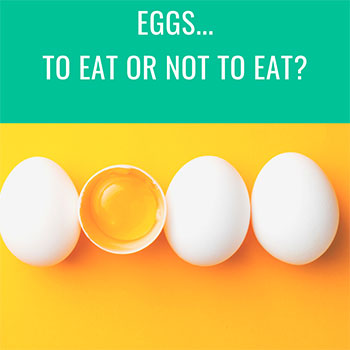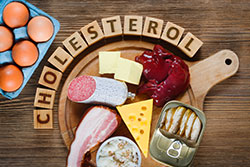Dear Dietitian,
I’m so confused! One day the “experts” are telling me to avoid eggs because they are bad for my heart. Then they tell me eggs are an excellent source of nutrition and I learn all sorts of new ways to cook them. Now, there is a new report saying eggs are linked to increased cholesterol and heart disease! What am I supposed to do? I like eggs. They are easy to prepare, inexpensive and I thought they were good for me. Please help me understand what I am supposed to do with this new information and reports being spread on social media about eggs.
Thanks,
Confused Client
Does this sound familiar? Read on to see my response to my Confused Client. If you have any additional questions, simply respond here!
|
|
|
How to Eat Eggs...
|
 Dear Confused Client, Dear Confused Client,
Let me begin by saying thank you for reaching out and seeking my advice on this topic. Please know you are not the only one confused, the latest study about eggs and their impact on heart health has left many people asking: “Are eggs good or bad for me?” I hope my response helps you understand how to apply the study findings to your own life.
On March 15, 2019, the journal JAMA released a study, Associations of Dietary Cholesterol or Egg Consumption With Incident Cardiovascular Disease and Mortality. This study found that eating three to four eggs per week was linked to a 6 percent increase in a person's risk of developing heart disease and an 8 percent increase in their risk of dying from any cause during the study period, compared with not eating eggs.
The initial shock that consumers (along with health and nutrition experts) felt is understandable. Since 2016, when the new Dietary Guidelines for Americans were released and the recommendation on limiting eggs because of cholesterol was dropped, we (as a society) have been on an egg-cellent egg cooking, egg consuming journey. (*Note, when I reference the term “we” I am referring to our general society and how “we” have perceived nutrition information or misinformation.)
However, before the 2016 report was released, there was a general consensus among consumers and many health experts that consuming too many eggs or other foods high in cholesterol was associated with an increased risk of heart disease. Nutrition and health experts recommended limiting egg consumption to 3 - 4 egg yolks a week.
With the surge in diet trends such as low carb, paleo and keto - along with the new “green light” to eat more eggs, we did what we do best - we assumed that if there is no limit on eggs, then more must be better! We stopped eating eggs in moderation and instead began to eat eggs for breakfast, at lunch and dinner. New food trends emerged serving fried eggs on salad, burger, pizzas and more. According to the U.S. Department of Agriculture, Americans are now consuming 280 eggs per person per year, which is significantly more than consumed a decade ago.
I am sharing this to say I don’t believe eggs are bad or need to be avoided, as they do provide a variety of nutrients such as protein, essential amino acids, iron, and choline. However, this also doesn’t mean they should be consumed in unlimited quantities. There has been a lot of research published on this topic and the general consensus finds that low to moderate egg consumption (about 3 - 4 yolks per week) is not associated with an increase in heart attack or stroke.
At the end of the day, the full spectrum of your nutrition and lifestyle habits matter and will impact long-term health and disease. Eat more plant-based foods, limit animal products, eat more fiber-rich foods (from plant-based sources) reduce added sugars in the diet, if you drink alcohol, drink in moderation and participate in regular physical activity.
Please remember we can also set up an appointment to discuss in further detail and customize a nutrition plan to maximize your health.
Sincerely,
Stephanie |
|
|
More Info on Cholesterol
|

While the relationship between the amount of cholesterol in your diet and the amount in the blood is complex, there is one thing that is true - the more cholesterol in your diet, the greater your risk for heart disease. Listed below are additional sources of dietary cholesterol that should be limited and reduced for optimal heart health.
- Fried foods
- Red Meat
- Processed meat
- Cheese
- Organ meat such as liver
- Sardines
- Shellfish (including clams, crab and shrimp)
- Desserts such as cookies, cakes and ice cream
|
|
Featured Recipe
Banana-Blueberry Oatmeal
|

Just add hot water to this tasty mix of oats, fruits and egg whites for an instant post-workout favorite.
Ingredients:
- 1/2 cup quick oats
- 1/4-1/2 cup organic blueberries
- 3 tbsp AllWhites 100% liquid egg whites
- As needed- hot water or unsweetened almond milk
- ½ banana, mashed
- To taste- sea salt
- To taste- Stevia, or sweetener of your choice
Directions:
- Place oats in a bowl and add frozen blueberries (if using fresh wait until last step to add them).
- Add egg whites and hot water (or unsweetened almond milk). Stir to combine.
- Mash ½ a banana and add to oats.
- Add remaining ingredients and stir.
- Enjoy!
Recipe from All Whites |
|
|
Be Inspired
|
|
"The evidence is pretty clear that animal products and high-cholesterol products should be limited"
Dr. Andrew Freeman, director of the Cardiovascular Prevention and Wellness program at National Jewish Health
|
|
| About SO Nutrition |

Stephanie has been working in the field of nutrition and dietetics since 1995. She earned a Bachelor of Science degree in Dietetics from Michigan State University, completed an Approved Pre-Professional Practice Program at Western Michigan University and earned a Master of Business Administration from Baker College. She’s been a Registered Dietitian Nutritionist since 1996 and licensed in Texas since 2007. In 2008, Stephanie earned her certification in Childhood and Adolescent Weight Management.
Stephanie has extensive clinical & managerial experience, both in corporate settings and in the community. Now she wants to share her knowledge with you, because most (if not all) nutritional habits begin at home.
Stephanie and her family reside in Katy, Texas
|
| |
Copyright © 2019 Customized Nutrition Newsletters, All rights reserved.
|
|
| |
|
|